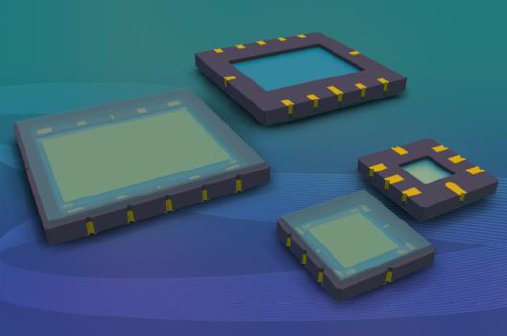The converter integrates an Indium-Gallium-Arsenide (InGaAs) photodiode array as a near-infrared detector with a special circuit to drive a green-emitting LED-array with the same pixel size and resolution as the detector array.
Thus, SWIR scenes can be easily examined with the naked eye or read in with a "normal" silicon-based camera, which has a maximum of the relative spectral sensitivity in the green spectral range.
The detection sensitivity of the DIRVIEW converter is currently ≤ 100 μW / mm2 irradiance at a conversion efficiency of ≤ 3% W / W from the near-infrared to the visible light. For lower light object scenes the use of a sensitive camera may be in certain circumstances be recommended to record the green LED intensity distribution. Also the response time of the converter is short and is in the range of at least a few hundred MHz to> 1 GHz.
The default local resolution of the DIRVIEW converter is 320 x 320 or 1280 x 960 pixels (resolution detector array = resolution emitter array) with a pixel size of only 10 μm , resulting in a recording and emission area of only 3.2 x 3.2 mm2 or 12 , 8 x 9.6 mm2 . Deviating DIRVIEW resolutions can be customized.
The operating voltage amounts typically to only 3V at a low power consumption, so that the converter is also suitable for mobile applications with battery operation. For best LED beam distribution and pixel availability, we recommend a slightly higher operating voltage of optimal and maximum 6V, with increased power consumption.
Small and lightweight 8LCC or 12LCC ceramic packages with dimensions of 8 x 8 x 1.15 mm3 or 18 x 18 x 1.45 mm3 are standardly used as housings for the DIRVIEW converter.
Possible applications include fiber optic testing, laser beam analysis, microscopy, solar cell inspection, fire detection, high-speed SWIR imaging, and many more.

